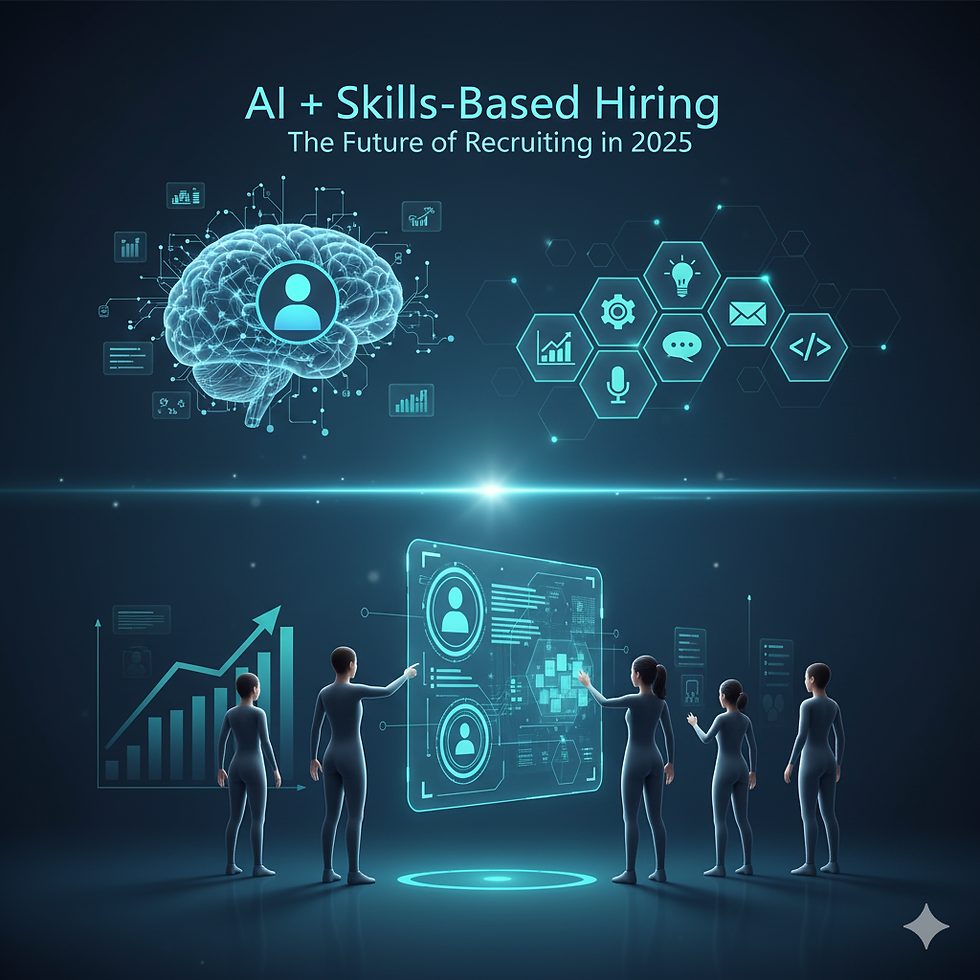Skills-Based Hiring for Data Science & ML Roles: A Practical Guide
- Saman Nayab
- Jul 14
- 4 min read

Hiring data scientists and machine learning engineers has become one of the most critical—and most misunderstood—tasks for modern startups. These roles require more than just technical proficiency; they demand business acumen, cross-functional communication, and a balance of deep analytical thinking with real-world problem-solving.
Yet most companies still rely on outdated hiring models: resume screening, university name-checking, and vague coding interviews. The result? Bad hires, missed potential, and burned time.
At Behoof, we take a different approach: skills-based hiring. We focus on what candidates can actually do, not just where they've worked or what credentials they list.
This guide will show you how to attract, assess, and hire top-tier data talent—efficiently, affordably, and with confidence.
Why Traditional Hiring Fails for Data Roles
Data science is not just about coding—it’s about impact. A data scientist might be excellent at building models, but if they can’t explain insights to a product manager or influence a decision, their value shrinks.
Yet, traditional hiring often filters candidates through:
Keyword-stuffed resumes
Irrelevant degree requirements
“FizzBuzz-style” coding tests
Unstructured interviews
These outdated filters screen out promising talent and let weak candidates slip through.
Hiring for data roles needs more precision and fewer assumptions.
What Skills Actually Matter in DS/ML Roles
Whether you’re hiring a Data Analyst, Data Scientist, ML Engineer, or AI Researcher, the following skill clusters are critical:
1. Core Technical Skills
Python/R/SQL fluency
Model building (regression, classification, clustering)
Data wrangling and feature engineering
Familiarity with libraries like Scikit-learn, TensorFlow, and PyTorch
2. Analytical Thinking
Framing the right problem
Designing experiments
Drawing business insights from messy data
3. Communication & Collaboration
Explaining technical outcomes to non-technical stakeholders
Working across teams (product, marketing, finance)
4. Business Acumen
Understanding KPIs
Connecting analysis to revenue or user engagement
5. Culture Add & Soft Skills
Growth mindset
Accountability
Adaptability in ambiguous environments
These aren't always obvious from a resume, but they are testable.
We’ve helped companies build entire data teams using our skills-first model. Here’s how we do it:
🔍 1. Role-Specific Assessments
Every candidate goes through technical assessments powered by our testing partners, including:
HackerRank: for coding challenges in Python, SQL, and data manipulation
TestGorilla: for cognitive reasoning, statistics, and business case simulation
Codility: for algorithmic problem-solving
We tailor the tests to the job level. For example, a Data Analyst might get a SQL-heavy dataset challenge, while a Machine Learning Engineer might be asked to optimize a model’s AUC or detect overfitting.
🧠 2. Cognitive & Problem-Solving Tests
We assess how candidates think, not just what they know. These tests include:
Logic puzzles and pattern recognition
Attention to detail exercises
Situational problem-solving under time pressure
This helps filter candidates who can thrive in messy, real-world data environments.
🗣️ 3. Communication Evaluation
We simulate scenarios where candidates must:
Present findings from an analysis
Explain a model to a product stakeholder
Handle pushback from leadership
This is often where “technically great” candidates fall short—and where business impact gets lost.
💡 4. Culture Add + Personality Mapping
We run psychometric evaluations to understand whether candidates are:
Collaborative or independent
Risk-taking or cautious
Detail-oriented or big-picture thinkers
Matching these dynamics to your company culture improves long-term success and reduces friction.
How Startups Can Hire DS/ML Roles Without Breaking the Bank
The belief that hiring data scientists requires VC-sized budgets is outdated.
Here’s what smart startups do instead:
Go global: Remote talent lets you hire from lower-cost markets without compromising quality.
Skip commissions: Use a flat-fee hiring partner like Behoof ($5K per hire), instead of paying 20–30% of a $120K+ salary.
Target outcomes: Focus on performance-based assessment, not pedigree.
We helped one early-stage AI startup in the US hire 2 ML engineers and 1 Data Scientist within 12 days—saving over $50K compared to traditional recruiting.
They didn’t just save money—they found better culture-aligned hires who delivered in weeks.
Common Mistakes to Avoid When Hiring Data Talent
❌ Mistake 1: Over-indexing on Education A PhD in ML doesn’t always translate into product-ready skills. Many top performers are self-taught or bootcamp grads.
✅ What to Do Instead: Assess their code, not their credentials.
❌ Mistake 2: Ignoring Business Communication A brilliant model that can’t be explained or shipped is a wasted investment.
✅ What to Do Instead: Test for communication and stakeholder interaction.
❌ Mistake 3: One-Size-Fits-All Interviews. Your sales hire and your data hire should not follow the same process.
✅ What to Do Instead: Customize assessments to the role.
Extra Tip: Where to Look for Great DS/ML Candidates
You don’t have to wait for applications to roll in. Some of the best DS/ML professionals hang out in places like:
Kaggle competitions
GitHub (open-source contributions)
Data science LinkedIn groups
Specialized communities like DataTau and r/MachineLearning
Behoof actively sources from these communities, bringing in passionate talent you might miss on traditional job boards.
Also, consider leveraging alumni groups, Slack communities, and specialized job boards like ai-jobs.net or RemoteML.io. Targeting niche audiences will yield more relevant, engaged applicants.
Another powerful option is tapping into referral networks within the DS/ML community. Professionals often refer former colleagues they trust—especially when the hiring process is transparent and skill-based.
Final Thought: You Don’t Need to Be a Data Expert to Hire One
One reason many founders hesitate to hire their first data person is that they don’t know how to evaluate them.
That’s where we come in.
At Behoof, we help non-technical teams hire for deeply technical roles with confidence. From role scoping to final interviews, we provide everything you need:
Pre-assessed candidates
Transparent workflows
Flat-fee pricing
Hiring support from sourcing to onboarding
And we do it in 7–10 days.
Want to hire smarter? Let’s talk. 👉 Book a free consult with Behoof and let us help you find your next great data hire




Comments